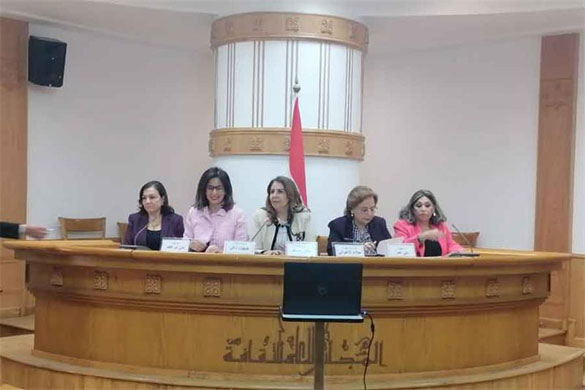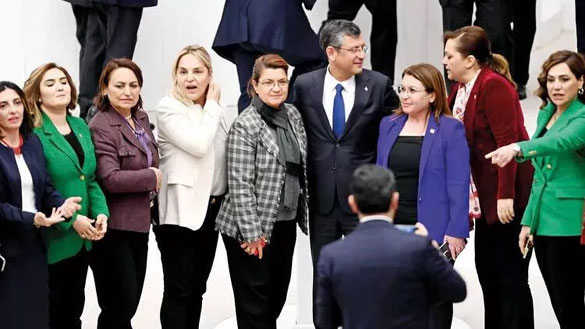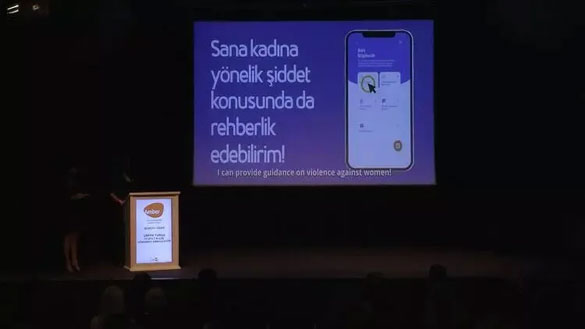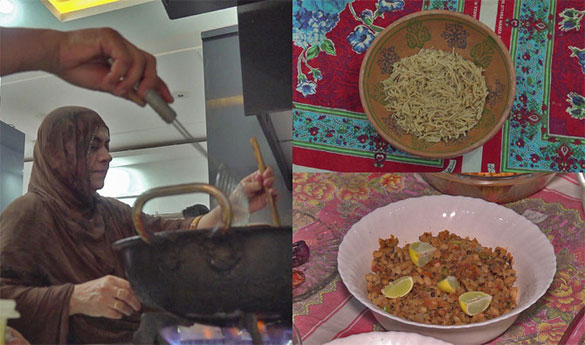Egyptian Women In Public Domain: Models Of Awareness, Will And Passion
New Age Islam News Bureau
13 April 2023
• Low Number Of Female MP Candidates Stirs Reaction In
Turkey
• Mobile Application With ‘Hidden Tab’ On Violence
Against Women Developed ByUNFPATürkiye
• Women From Pakistan’s Sindhi Community Share Ramadan
Recipes Perfected Over Generations
• For Rohingya Women In Bangladesh, Ramadan Brings
Back Memories Of Life In Myanmar
Compiled by New Age Islam News Bureau
URL:
--------
Egyptian Women In Public Domain: Models Of Awareness,
Will And Passion
Amira Noshokaty
12 Apr 2023
 Prominent Egyptian Women in The Public Domain
Prominent Egyptian Women in The Public Domain
-----------
The seminar, held under the auspices of Nevine
El-Kilany, the Egyptian Minister of Culture, and Hisham Azmy, the Secretary
General of the Supreme Council of Culture, the seminar, was run by Professor
Adla Ragab.
"The idea was to share the achievements of these
four bright stars in the realm of the public domain," explained Professor
Nevine Mossad, the moderator of the seminar, as she introduced them in
alphabetical order.
GihaneZaki: Awareness, Identity and Belonging
GihaneZaki, a professor of Civilization and Religion
of Ancient Egypt and History of Art, has held numerous national and
international posts in the realm of heritage.
In 2011, she became UNESCO's regional office
consultant for World Heritage.
A year later, she became the first woman to hold the
prestigious position of Director of the "Accademia di Belli Arti d’Egitto
a Roma".
"It was a very big challenge, for all 13
directors before me were male artists, and I was the first woman who practiced
art management," she said.
She added that another major challenge she faced was
from the radical religious regime in power at that time, which threatened to
sell off Egypt's section in the Venice Biennale.
"It was all about preserving our identity on a
foreign platform through arts and culture so we launched the Egyptian Replicas
Art effects of Tutankhamen that put Egyptian heritage upfront on the Touristic
Map of Rome as well as the Italian public schools.
“In 2013, we also managed to establish an art and
cultural connection with the Vatican, which was soon followed by the historic
visit of Azhar Grand Imam to Pope Francis," she added.
Zaki has recently started her initiative to raise
cultural and heritage awareness among the children of security guards in her
community.
She believes that the only way to preserve our
identity is to raise awareness of our heritage and hence increase our sense of
belonging.
Mona Zulficar: "In Egypt - All Dreams Are
Possible"
Known as "the Lawyer of Unprecedented Legal
Deals," international corporate lawyer and head of the Egyptian Federation
for Financing MSMEs-MSMFS, Mona Zulficar's name has always been affiliated with
human and women's rights laws and the Egyptian constitution.
Being the daughter of renowned Egyptian actor Salah
Zulficar, she was asked during the seminar on why she was never tempted to try
a career in the arts.
"You see, law is an art and every day I stand on
the stage and defend a cause," she said.
She noted that she was a leading actress in college
where she won the golden cup for two successive years.
However, she added that acting was taking away too
much time from her studies and she decided to focus on academia.
After graduation from the Faculty of Economics and
Political Science in 1969, Zulficar
started her career at the United Nations.
She was then appointed a manager at the prominent
Shalakany Law Offices where she would facilitate communication between clients
and lawyers when English was a barrier at that point.
Soon after, she studied law and found herself drawn to
women's causes.
Women’s causes came naturally to Zulficar given her family background.
"My father was the producer of films that
empowered women, such as MeratiModir Am (My Wife is the General Manager) and
OreedHalaa (I Want a Solution). My mother was one of the founding members of
the Women's Association for Health Improvement," she noted.
In a time when there were no national councils for
women or human rights, Zulficar collaborated with prominent figures of civil
society, such as Aziza Hussien, and drafted a booklet on women's legal rights
theory and implementation.
"I introduced the new marriage contract in this
booklet that was highly opposed because it included the woman's rights to add
new conditions in the contract. I argued that conditions added in old marriage
contracts date back to the 15th century and we should not be opposing new
ones."
Zulficar was the woman behind the Khul3 law, which
allowed Egyptian women to divorce husbands, to name but a few of her
achievements.
As founder and chairperson of Al Tadamon Microfinance
Foundation, she set a successful example of microfinance that changed the lives
of 5 million Egyptians.
"In Egypt, all dreams can come true; it needs
patience, perseverance, and partnership," she concluded.
Mona Omar: The key word is Passion
Ambassador Mona Omar, former assistant minister of
foreign affairs for Africa and member of the Advisory UN Committee on Human
Rights and the National Council of Women, has always had a passion for Africa.
After attaining her college degree in 1975, she embarked
on a diplomatic career, holding multiple posts in Africa.
"I have always believed that Africa is the future
of Egypt and it is the backbone of economic and political security for
Egypt," Omar noted.
She was based in South Africa during turbulent times
before the election of Mandela in the early 1990s.
She also served during the Rwanda massacres in the mid
1990s.
Omar explained the critical circumstances she was put
in and how she managed to navigate through it all.
“Love and passion are the driving forces behind her
successful journey,” she stressed.
Naglaa El-Ahwany: Willpower
Professor of economics and former minister of
international cooperation, Naglaa El Ahwany, is also a board member of the
ERADAA (Egyptian Regulatory Reform and Development Activity) initiative.
"As the minister of international cooperation, we
overcame many difficulties such as bureaucracy while cooperating with other
ministries. We also faced a lot of resistance from several European countries
when we applied to become members of the EuroBank," El Ahwany explained.
“Every big achievement comes with overcoming
obstacles. We do not possess the luxury of failure," she concluded.
Source:Ahram
--------
Low Number Of Female MP Candidates Stirs Reaction In
Turkey
April 12 2023
 Nongovernmental organizations and activists struggling
for equal representation of women in politics and social life have criticized
the low number of women on political parties’ parliamentary candidate lists,
describing it as “dishonourable.”
Nongovernmental organizations and activists struggling
for equal representation of women in politics and social life have criticized
the low number of women on political parties’ parliamentary candidate lists,
describing it as “dishonourable.”
The lists of parliamentary candidates were a big
disappointment in terms of gender equality, said Nuray Karaoğlu, the head of
the Association for Supporting Women Candidates (KA-DER), criticizing the
ruling Justice and Development Party (AKP) and the main opposition Republican
People’s Party (CHP) for including only 113 and 147 women, respectively, in the
600-person list.
“Though 50.7 percent of Türkiye is women, this rate is
only 17.2 percent for deputies. We are fighting to get the seats that are
already ours,” Karaoğlu said. “The demand of women, who struggle in all areas
of life, to govern the country equally was once again ignored by men.”
According to the latest report of KA-DER, there may be
female MPs in this election from Giresun, Osmaniye, Ardahan, Burdur and
Nevşehir, which are among the 20 provinces that have never had female
parliamentarians throughout the history of the republic, she added.
“Democratization cannot be done by excluding women.
While women struggle with their own problems, they act with the awareness and
responsibility of building a better world and future. In other words, the
struggle of women is also a struggle of every citizen in the country to make an
equal, fair and free social life possible,” said İlknurÜstün, the coordinator
of women’s rights organization Women’s Coalition.
Though there were an unprecedented number of women
candidates’ applications for the 2023 elections in the history of the republic,
the lists are completely dishonourable, activist Mine Olcay also said.
“Today’s civilization is the product of tens of
thousands of years of cooperation between men and women. Now, let’s quickly
turn from this mistake and lay the foundation for a happier life together,” she
stated.
The fact that women, who make up half of the
population, cannot participate in the decision-making processes and are not
equally represented in politics is a problem of democracy first and foremost,
AslıPasinli from the Women’s Platform for Equality (EŞİK) said.
“In this period when women’s gains are openly
targeted, we should all think about the inequality picture revealed by the
lists,” she added.
Source:HurriyetDailyNews
https://www.hurriyetdailynews.com/low-number-of-female-mp-candidates-stirs-reaction-182302
--------
Mobile Application With ‘Hidden Tab’ On Violence
Against Women Developed By UNFPA Türkiye
April 13 2023
 The United Nations Population Fund (UNFPA) Türkiye has
developed a new mobile application to raise awareness about violence against
women and provide assistance in the event of violence.
The United Nations Population Fund (UNFPA) Türkiye has
developed a new mobile application to raise awareness about violence against
women and provide assistance in the event of violence.
The application looks like a sexual and reproductive
health guide and a menstrual calendar at first glance, yet with a hidden second
screen, it provides assistance to women when they are in unsafe situations and
helps them keep logs of the abuse they are experiencing.
The launch of the app was held at an event space in
Istanbul’s Sarıyer district with the participation of UNFPA Türkiye Representative
Hassan Mohtashami, Women’s Coalition Representative Selma Acuner, Carl Spychal
on behalf of the British ambassador to Türkiye, UNFPA Türkiye Goodwill
Ambassadors actress SongülÖden and pop singer EdisGörgülü and many other
guests.
Information on how to use the application was also
shared at the meeting.
In his speech, Mohtashami emphasized that gender
equality and women’s empowerment is the cornerstone of the development and
security of a nation.
Öden stated that the fund has been meticulously working
on this application since 2020.
She said that the app aims to provide women with
emergency call buttons, legal information, to define the types of violence, and
to help them become aware of whether they have been subjected to this type of
violence in various surveys. The app also helps women to send their location to
people whenever they are in danger.
“We want more women to benefit from it,” Öden said.
Öden noted that even though it looks like a regular
menstrual cycle tracking app, when the user taps on the button four times, the
hidden page appears on the screen. There it shows the user which organizations
are closest to their location and their contact numbers.
“Therefore, this application contains a very important
confidentiality agreement,” Öden added.
Listening to the details of the application for the
first time at the launch, Görgülü stated that it is the first application he
has seen that enables a woman to keep records of the violence she endures on a
daily basis.
Source:HurriyetDailyNews
--------
Women From Pakistan’s Sindhi Community Share Ramadan
Recipes Perfected Over Generations
BURAQ SHABBIR
April 13, 2023
 KARACHI: Sindhi women in Pakistan’s southern port city
of Karachi are trying to relive the memories of sunset Iftar meals as they were
served in the 1970s, saying that original recipes featured mild spices and were
unlike the food consumed during Ramadan today.
KARACHI: Sindhi women in Pakistan’s southern port city
of Karachi are trying to relive the memories of sunset Iftar meals as they were
served in the 1970s, saying that original recipes featured mild spices and were
unlike the food consumed during Ramadan today.
The Sindhi community constitutes one of the largest
ethnic groups in Pakistan. The cuisine originating in the region is popular in
many countries across the world, including India, where a sizable number of
Hindus belonging to the area migrated following independence in 1947.
Sindhi food is heavily influenced by Arabs, Mughals
and Turks, who ruled the region at different points in history.
The native cuisine of the Sindhi community is unique
in taste, though Sindh shares similar culinary traditions with India’s Gujarat,
Rajasthan and Mumbai, according to the Sindh Tourism Development Corporation.
“I witnessed the special traditions of Iftar when I
came to Karachi,” Tasneem Nizamani, 57, a retired Sindhi teacher, told Arab
News. “When we were young (in the 1970s) in our village, our grandmother did
not add a lot of spices (to the food). When she would make chicken, which we
call Sindhi Murghi, it only contained onions.”
She said that her family used desi ghee prepared at
home.
“My grandmother would either add a bit of black pepper
or red pepper, but we never saw so many spices (being added to food) in our
village, which we see today in Karachi,” she added.
Nizamani hails from a humble household in Malhan
located in District Badin. When she was in her early teens, her family used to
have very simple iftars with dates and a traditional drink called thaadal that
contained a variety of crushed nuts, herbs and black pepper.
“When I was young, my father used to make thaadal,”
she said. “He would grind white cumin seeds, black pepper, almonds and green
cardamom in kundo, a special thick earthen container with a rough surface and a
heavy wooden pestle. It used to be a staple drink in Iftar when we were young.”
Thaadal is a refreshing drink that originated in
Nawabshah, a small town in Sindh. It is easily available in the market today in
fancy packaging.
Some of the famous Sindhi cuisines at the time, said
Nizamani, included a special type of spinach called “lulur ka saag.” It was not
sowed but rather grew naturally when it rained. Gajar palak (carrot and spinach
gravy) and mooli (radish gravy) were also unique vegetable dishes made in the
Sindhi households and were uncommon in other communities.
“When Ramadan is around the corner, we especially
prepare handmade sawaiyan (vermicelli) and consume it in suhoor (the morning
meal before fasting),” she said.
“We strain whole wheat flour on a piece of cloth and
then knead it. We fix a machine in a charpoy and then two women make small
doughs and put them in the machine. The machine is run with hands.” It is then
left to dry under the sun before being mixed with oil and sugar.
Speaking of unique twists to iftar staples popular
across Karachi, Nizamani shared a few recipes, which she said were common in
Sindhi households. As opposed to sweet dahibaray (lentil dumplings soaked in
yogurt sauce), they make savory ones by adding green chilli paste to the batter
as well as yogurt.
Lobia (kidney beans) chaat is a regular dish in the
iftar platters of Sindh, according to Nizamani. Boiled beans are added to a
mixture of sauteed onions and tomatoes, and sprinkled with light spices.
“Chana (chickpea) is heavy. We fast and have empty
stomachs all day long, so when we consume something heavy, it makes us sick,”
Nizamani said, adding that kidney beans were lighter and easier to digest.
“If anyone falls sick in our home, this is the first
food we serve to them,” she added. “Boiled beans with black pepper and salt.”
Yasmeen Akhund, 54, who works as a headmistress in a
government school, said members of the Sindhi community had unique ways of
preparing their food.“We used to have simple salan (gravy) that didn’t have a
lot of spices but tasted really good,” she told Arab News.
“We didn’t have packaged spices back in the days when
I was young,” she added. “Even today, we make food the same way. The main
ingredient we use in our cuisines is onion. We do not use a lot of ginger and
garlic in our food. It was never a part of our meals in the past.”
Famous cuisine made in Sindhi households, according to
Akhund, includes alu bhindi fry (fried potato and okra), Sindhi biryani and
damra fish (labeorohita) that is served alone or with gravy along with rice.
“There is a very famous Sindhi breakfast dish called
kutti. It’s made of crumbled whole wheat flour roti (flatbread), tempered with
pure ghee and sweetened with sugar,” Akhund said.
Source: Arab News
https://www.arabnews.com/node/2285856/world
--------
For Rohingya women in Bangladesh, Ramadan brings back
memories of life in Myanmar
SHEHAB SUMON
April 12, 2023
DHAKA: Anwara Begum used to find herself busy with
preparations in the days leading up to Ramadan, when it had meant stocking up
on chickpeas and noodles, and making plans to distribute food for orphans and
the elderly in her village in Myanmar’s Rakhine State.
For the 50-year-old, the holy month had once been
filled with days of cooking alongside her older daughter. They would spend
hours in the kitchen making different kinds of dishes to break the fast, from
steamed glutinous rice to banana bread and vermicelli dessert.
“Sharing iftar with other people as much as I could
with what I had, greatly filled my mind with contentment and enjoyment at that
time,” Begum told Arab News.
“That would, of course, remain the greatest memory of
my life,” she said. “Recalling that pleasant time literally hurts me a lot and
breaks my innocent heart into pieces.”
Begum was among more than 740,000 Rohingya who fled to
neighboring Bangladesh in 2017, following a brutal military crackdown that the
UN says amounted to genocide.
Life — and Ramadan — was never quite the same in the
five years since she started living in the sprawling encampment in Cox’s Bazar,
Begum said.
“No sooner had we arrived at the camp, everything was
completely transformed into a challenge,” she said. “The injustices done to us
in Myanmar forced us here into a life of poverty, unemployment and uncertainty.”
The Rohingya, who are predominantly Muslim, are facing
worsening conditions, as international aid for the group has fallen since 2020.
The UN World Food Program decided to cut food rations earlier this year, after
its pleas for the Rohingya had not been met.
For many Rohingya, their difficult lives as refugees
are even more pronounced this Ramadan.
“The meal we eat daily as iftar in the camp is neither
hygienic nor healthy,” Begum said. “It is close to a dream to expect a
delicious iftar. It isn’t even possible to buy what we need for a month as we
are now receiving less aid compared with the months before.”
When she lived in Myanmar, Nosima Khatun said she
would make lurifira, a traditional Rohingya bread made with rice flour, which
her family preferred to eat with beef curry for iftar.
“I wanted to make my family happy with the utmost joy
during holy Ramadan,” Khatun told Arab News. “In Ramadan, I had a great moment
of joy and fulfillment that is irreplaceable with anything in life.”
Since she became a refugee in Bangladesh, those
pleasant moments have become distant memories.
“I am stuck in an unprecedented situation like a bird
in the cage. The dependency on rations has left me so helpless,” Khatun said.
These days, Khatun can only serve a few things for the
pre-dawn meal of suhoor and iftar, such as chickpeas and dates. What little she
can come up with is “not enough” for her four-member family, she said.
“Whenever I recall the old days in my homeland, I fall
into the ocean of serious grief as I won’t have that time again in my life,”
she said.
Tasmin Begum, 35, said her life was marred by
difficulties in Myanmar, where her husband was forced to work petty jobs as
employment in the public sector was off-limits for the Rohingya.
Myanmar does not recognize the Rohingya as an
indigenous ethnic group. Most people from the long persecuted community were
rendered stateless under the country’s 1982 Citizenship Law and had been
excluded from the 2014 census.
Though celebrations and gathering in public places were
not easy even during Ramadan, Begum would try to make the most of it by
spending many hours in the kitchen, making a variety of steamed snacks and rice
cakes, among other dishes.
“After fleeing to Bangladesh, I started to suffer the
pains of refugee life,” Begum said. “Now in Ramadan, here I can have only
chickpeas and puffed rice.”
The Rohingya women Arab News spoke to for this story
said that they longed to return to their homes in Myanmar, fearing prolonged
lives as refugees. But like so many others in their community, they want their
rights guaranteed.
“There are innumerable sufferings in refugee life — no
respect, no dignity to survive as a human being,” said Anwara Begum.
Khatun hopes for an immediate return to her
motherland, “because I want to die in the soil of Myanmar.”
Tasmin Begum, too, has a similar wish.
“I wish I could go back to Myanmar with our rights
restored as I don’t want to become a refugee for the rest of my life,” Begum
said. “I don’t want to be the victim of genocide in my homeland. The only thing
I want is to spend the rest of my life peacefully.”
Source: Arab News
https://www.arabnews.com/node/2285571/world
--------
URL: https://newageislam.com/islam-women-feminism/egyptian-women-public-domain-models/d/129555
New Age Islam, Islam Online, Islamic Website, African Muslim News, Arab World News, South Asia News, Indian Muslim News, World Muslim News, Women in Islam, Islamic Feminism, Arab Women, Women In Arab, Islamophobia in America, Muslim Women in West, Islam Women and Feminism
